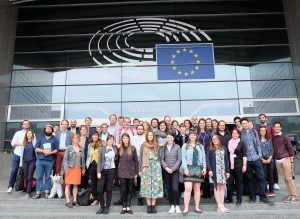EBA gets bigger and visible!

On 27th June, 50 participants from 11 different countries attended the the European Badge Alliance-EBA conference in Brussels, to discover the outcomes of this 2-years Erasmus+ Strategic partnership.
The presentations and publications related to the conference can be found here.
The event had both a political and a training dimension. In the morning, the conference was held at the European Parliament, hosted by MEP Svetoslav Malinov, the rapporteur on the Europass revision initiated by the European Commission. The fact that the EU tool for recognition of competences is under revision, makes it a great opportunity for EBA to advocate for the adoption of Open Badges as a tool for recognition of competences from learning mobility.
An inspirational speech by Andrea Lombardi from UNISER opened the discussion about the educational impact of mobility and the need for its recognition. As he said ‘Many people do not consider essential to experience life abroad and learn other languages, yet. Still too many people estimate that you can have a very good life anyway. How could we make people care about their personal internationalisation? The answer is certifying the empowerment that people achieve through a mobility experience in such a way that it is able to unlock opportunities, the same kind of opportunity people saw in the past when they went to school to learn to read and write’ .
Then the representatives of project partners Laimonas Ragauskas (Lithuanian Association of Non-formal Education) and Panagiotis Chatzimichail (Youth for Exchange and Understanding) presented the reasons why Open badges are a good tool to recognise learning from mobility experiences, and gave examples of the Badge systems that were created for diverse types of learning mobilities within the EBA project.
Finally, Elisa Briga from EFIL provided an overview of the actions that need to be taken by policy makers and other stakeholders for a wider use of Open badges.
Also experiences with Open Badges in other sectors were presented, in order to show that badges are more and more used: Politecnico of Milan showed how they are used for teacher training, and the Municipality of Ghent explained how these are used to certify accomplishment of tests done to select personnel of the the public administration
Finally, William O’Keffee from the European Commission-DG Employment reacted to the presentations by confirming that the EU is looking into how to integrate Open badges in the Europass. In fact, Europass is a public service that needs to respond to EU citizens’ needs in terms of visibility of competences: if Open Badges are the tool used by citizens, Europass needs to be open to it.
MEP Malinov concluded that the EU always provides the common lower denominator in terms of legislation: Member states and especially civil society, can always do more. This is the case of Open Badges: they are a development coming from society and it will not be stopped.
After a productive networking lunch, participants attended a training aimed at presenting in detail the different badge systems created by EBA, providing guidance on how to come up with a badge system and use the Badgecraft.eu platform to issue badges. Participants were very active and much input was gathered for the further development of Open Badges.
EBA does not end with the Erasmus+ project that created it, it will continue and gather organisations active in learning mobility who are committed to use Open Badges as a tool for recognition of competences. We are glad to welcome new organisations in the Alliance: “MilleniuM” Training and Development Institute (Moldova), Breakthrough Foundation (the Netherlands), Ha Moment (Portugal), Social Action (Lithuania). If any organisation willing to use Badges for learning mobility projects wants to join, do not hesitate and fill in this form.
Have your say!